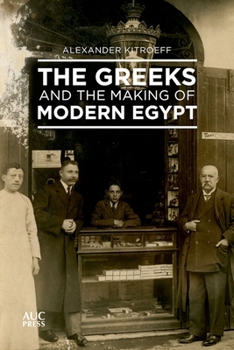The Greeks and the Making of Modern Egypt
The "magnificent" (Robert L. Tignor, Princeton University) story of the Greeks in Egypt from Muhammad Ali to Nasser
From the early nineteenth century through to the 1960s, the Greeks formed the largest, most economically powerful, and geographically and socially diverse of all European communities in Egypt. Although they benefited from the privileges extended to foreigners and the control exercised by Britain, they claimed nonetheless to enjoy a special relationship with Egypt and the Egyptians, and saw themselves as contributors to the country's modernization. The Greeks and the Making of Modern Egypt is the first account of the modern Greek presence in Egypt from its beginnings during the era of Muhammad Ali to its final days under Nasser. It casts a critical eye on the reality and myths surrounding the complex and ubiquitous Greek community in Egypt by examining the Greeks' legal status, their relations with the country's rulers, their interactions with both elite and ordinary Egyptians, their economic activities, their contacts with foreign communities, their ties to their Greek homeland, and their community life, which included a rich and celebrated literary culture. Alexander Kitroeff suggests that although the Greeks' self-image as contributors to Egypt's development is exaggerated, there were ways in which they functioned as agents of modernity, albeit from a privileged and protected position. While they never gained the acceptance they sought, the Greeks developed an intense and nostalgic love affair with Egypt after their forced departure in the 1950s and 1960s and resettlement in Greece and farther afield. This rich and engaging history of the Greeks in Egypt in the modern era will appeal to students, scholars, travelers, and general readers alike.Format:Hardcover
Language:English
ISBN:9774168585
ISBN13:9789774168581
Release Date:May 2019
Publisher:American University in Cairo Press
Length:256 Pages
Weight:1.10 lbs.
Dimensions:1.0" x 6.2" x 9.1"
Related Subjects
HistoryCustomer Reviews
0 rating





